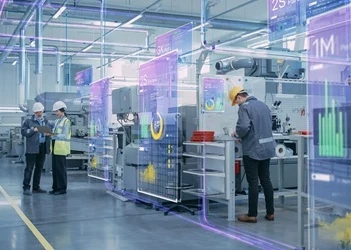PEX retrospective series: Trends in intelligent automation in 2021
Looking back to 2021 we assess how intelligent automation initiatives have evolved over the last year
Add bookmark
Automation has been a highly-lauded approach to process optimization and standardization for several years now. In more recent times, the practice of automating processes has evolved as it has been augmented with newer technologies and techniques, resulting in a more advanced type of automation known as intelligent automation.
Intelligent automation can be defined as a combination of business process management (BPM) methodology and software, machine learning (ML), artificial intelligence (AI), data analytics and process mining.
The team at PEX Network set out to uncover how the practice of intelligent automation has evolved over the last year.
AI and ML applied for predictions
In PEX Network’s Using intelligent process automation to build business resiliency report published in March of 2021, it was revealed that at Rolls-Royce attempts to overhaul processes through automation were well under way.
The global automotive manufacturer had implemented automated initiatives for health monitoring and predictive maintenance purposes through augmentation with advanced technologies such as AI and ML.
The 2021 report noted that applying AI and ML to add predictive capability to automated initiatives would likely be emulated as more organizations seek to gain it for their own initiatives.
PEX Network’s Trends and predictions in process excellence 2022 report found that this assertion was likely correct with Maersk, a Danish shipping company, stating that they had similar intentions for the development of their automated processes.
The original initiative employed by Maersk to revamp its fragmented technological landscape and collate vast numbers of disparate data sources led to a new vision: to add in AI and ML technologies in order to enable predictions. The goal of this was to take customer behavior analytics to the next level for cash collections by automatically predicting their risk level.
Vineet Mehra, general manager and product head of OTC at Maersk, remarked: “At Maersk we constantly challenge the status quo to revamp how best we serve our partners, which brings the need for a new operating style, upskilling, a center of excellence (CoE) setup and a look at business metrics that drive outcomes.”
The reduction of human action for intelligent automation initiatives
The point of automation is to have processes that would traditionally be completed by a human instead carried out by a bot. However, this does not mean that humans are not generally needed in some capacity to ensure this automated process is carried out as intended.
Lee Glazier, head of service integrity at Rolls-Royce, stated in PEX Network’s Using intelligent process automation to build business resiliency that “any data feed coming from humans or machines is likely to have inaccuracies, and bias, whether conscious or unconscious” and “[data sets are best when] automatically acquired, requiring no human intervention to acquire or transfer it between systems”. It is Glazier’s belief that humans can bring more value to an automated process through a role more focused on orchestration of, for example, a robotic process automation (RPA) bot or an ML model.
We have seen this idea develop and foster within other organizations, with Spotify pushing the boundaries of actions and decisions that are typically considered to require human interaction. In PEX Network’s The PEX Report 2022: Global state of process excellence, Sidney Madison Prescott, global head of intelligent automation at Spotify, revealed the extent of the global music streaming service’s intelligent automation initiatives.
On the back of a huge automation initiative that saw the business implement a CoE along with 180 bots in less than 18 months, Spotify has saved over 40,000 hours through the automation of manual processes. Prescott notes that the business is now beginning to push the envelope by considering automation for tasks that traditionally require a human level of decision-making.
“We are beginning to look outside of RPA to encompass the depth and breadth of IA and as strong believers in continuous improvement of our offerings to internal stakeholders, the team is starting to think about true cognitive automation for processes that traditionally need a strong focus on human decision-making.”
Automation initiatives combined with low-code app development
Spiros Skolarikis, CEO at Comidor, shared his predictions for the trajectory of intelligent automation initiatives in PEX Network’s Using intelligent process automation to build business resiliency. He explained that the augmentation of automated process with further technologies, specifically enterprise low-code, would only become more prevalent in the future.
According to Skolarikis, enterprise low-code significantly accelerates the digital automation journey by minimizing time taken for maintenance, upgrading and enhancing implemented technologies.
Skolarikis’ prediction has proven correct, with Globe Telecom taking steps to augment automated attempts with a no-code approach. The business believed the approach was ideal for overcoming what they saw as the primary barriers to business process automation, namely a lack of available resources, business cases and tedious approval processes.
This initiative saw the business invite 187 participants to a remote, no-code hackathon and create more than 50 business applications to address frontline challenges, rolling out no-code application across the entire business, meaning that employees across the organization are now able to apply low-code and solve their own problems through automation.
As intelligent automation becomes more prevalent and practitioners become more comfortable with the technologies involved, we will continue to see new trends developing the field of automation.


































